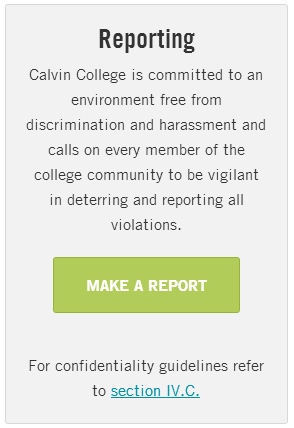Following approval from faculty senate this spring, Calvin administration has implemented “Safer Spaces,” a new system of policies and procedures regarding harassment, discrimination and retaliation.
These policies supersede all of the college’s current protocols pertaining to harassment, discrimination and retaliation and institute a standardized reporting system.
Newly appointed VP of student life Cindy Kok described the policy changes as “a clarification of the process we follow that makes everyone’s role clearer,” and explained that a main goal of the initiative is “delineating” the procedure that members of the Calvin community follow in engaging these issues.
Chaplain Mary Hulst explained the benefit of the changes as such: “instead of having [community members] figure it out on their own, we are doing this together,” emphasizing the initiative’s focus on “shared values, shared language.”
Some of the motivation for these changes comes from desire to ensure the college’s adherence to national standards in harassment and discrimination policy for higher education. “Federal guidelines have become specific and we want to make sure we are in compliance,” said Hulst.
Jane Hendriksma, dean for judicial affairs, stressed the importance of ensuring that students are aware of channels for dealing with these issues: “if they have a problem and are being harmed, there are people here to help them get support, reassure them and remedy the issue.” She went on: “they shouldn’t struggle with things alone.”
However, Hendriksma explained that the majority of this policy’s effect will relate to faculty and staff, as the protocol for students in “Safer Spaces” is “mainly the way we were working with students already.”
Changes for faculty primarily center on the assignment of roles and responsibilities under the new system — a process that occurred over the course of the summer — and the new procedures by which community members can report misconduct.
The Calvin Safer Spaces Committee (CSSC) will serve as the primary investigators and administrators of the policy.
“We are specifically investing in training for the people who will be on the safer spaces committee,” said Hendriksma. “We looked at all the different things that were best practices and are adopting this best practice.”
The system for reporting these behaviors provides several choices for filing a complaint. Students, faculty, staff and other members of the Calvin community can directly contact a member of the CSSC, report to supervisors, faculty members, and campus safety officers, or use a new online reporting system or a hotline telephone number.
Further provisions of the policy include amnesty for those reporting misconduct in the case of students drinking or using drugs at the time of an incident. Intended to prevent misconduct from going unreported due to fear of disciplinary action, this provision is accompanied by protections for those who attempt to reasonably and prudently intervene in situations of misconduct.
Additionally, the policy states that knowingly made false complaints will be subject to disciplinary action.
The confidential online reporting system, along with full information on the policy, including definitions of prohibited behavior and contact information for members of the CSSC is available online at www.calvin.edu/about/safer-spaces/.








